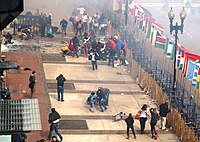Massachusetts manufactured 3.4 percent of total United States military armaments produced during World War II, ranking tenth among the 48 states.[122] In Eastern Massachusetts, following World War II, the economy was transformed from one based on heavy industry into a service-based economy.[123] Government contracts, private investment, and research facilities led to a new and improved industrial climate, with reduced unemployment and increased per capita income. Suburbanization flourished, and by the 1970s, the Route 128 corridor was dotted with high-technology companies who recruited graduates of the area's many elite institutions of higher education.[124]
The Kennedy family was prominent in Massachusetts politics in the 20th century. Children of businessman and ambassador Joseph P. Kennedy Sr. included John F. Kennedy, who was a senator and US president before his assassination in 1963, Robert F. Kennedy, who was a senator, US attorney general, and presidential candidate before his assassination in 1968, Ted Kennedy, a senator from 1962 until his death in 2009,[125] and Eunice Kennedy Shriver, a co-founder of the Special Olympics.[126] In 1966, Massachusetts became the first state to popularly elect an African American to the US senate with Edward Brooke.[127] George H. W. Bush, 41st President of the United States (1989–1993) was born in Milton in 1924.[128]
In 1987, the state received federal funding for the Central Artery/Tunnel Project. Commonly known as "the Big Dig", it was, at the time, the biggest federal highway project ever approved.[129] The project included making the Central Artery a tunnel under downtown Boston, in addition to the re-routing of several other major highways.[130] Often controversial, with numerous claims of graft and mismanagement, and with its initial price tag of $2.5 billion increasing to a final tally of over $15 billion, the Big Dig has nonetheless changed the face of Downtown Boston.[129] It has connected areas that were once divided by elevated highway (much of the raised old Central Artery was replaced with the Rose Fitzgerald Kennedy Greenway), and improved traffic conditions along a number of routes.[129][130] Additionally, Massachusetts has had a diplomatic relationship with the Japanese prefecture of Hokkaido since 1988.[131]
21st century
On May 17, 2004, Massachusetts became the first state in the U.S. to legalize same-sex marriage after a Massachusetts Supreme Judicial Court ruling in November 2003 determined that the exclusion of same-sex couples from the right to a civil marriage was unconstitutional.[57] This decision was eventually superseded by the U.S. Supreme Court's affirmation of same-sex marriage in the United States in 2015.
Boston Marathon bombing
On November 8, 2016, Massachusetts voted in favor of The Massachusetts Marijuana Legalization Initiative, also known as Question 4.[132] It was included on the United States presidential election, 2016 ballot in Massachusetts as an indirect initiated state statute.[133]


No comments:
Post a Comment